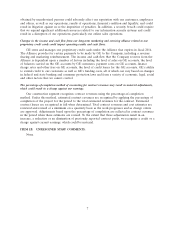Dillard's 2010 Annual Report Download - page 21
Download and view the complete annual report
Please find page 21 of the 2010 Dillard's annual report below. You can navigate through the pages in the report by either clicking on the pages listed below, or by using the keyword search tool below to find specific information within the annual report.
repurchase programs. Total shares outstanding at January 29, 2011 were 60.0 million shares
compared to 73.8 million shares at January 30, 2010.
As of January 29, 2011, we had working capital of $870.7 million, cash and cash equivalents of
$343.3 million and $946.4 million of total debt outstanding. We operated 308 total stores as of
January 29, 2011, a decrease of one store from the same period last year.
Key Performance Indicators
We use a number of key indicators of financial condition and operating performance to evaluate
the performance of our business, including the following:
Fiscal Year Ended
January 29, January 30, January 31,
(retail segment only, excluding cash flow data) 2011 2010 2009
Net sales (in millions) .................... $6,020.0 $5,890.0 $6,742.6
Gross profit (in millions) .................. $2,142.9 $1,982.9 $1,998.6
Gross profit as a percentage of net sales ....... 35.6% 33.7% 29.6%
Cash flow from operations (in millions) ....... $ 512.9 $ 554.0 $ 350.0
Total store count at end of period ........... 308 309 315
Sales per square foot ..................... $ 113 $ 110 $ 124
Net sales trend ......................... 2% (13)% (6)%
Comparable store sales trend ............... 3% (10)% (7)%
Comparable store inventory trend ........... (2)% (5)% (20)%
Merchandise inventory turnover ............. 2.8 2.6 2.6
Trends and Uncertainties
Fluctuations in the following key trends and uncertainties may have a material effect on our
operating results.
• Cash flow—Cash from operating activities is a primary source of liquidity that is adversely
affected when the industry faces economic challenges. Furthermore, operating cash flow can be
negatively affected when new and existing competitors seek areas of growth to expand their
businesses.
• Pricing—If our customers do not purchase our merchandise offerings in sufficient quantities, we
respond by taking markdowns. If we have to reduce our retail selling prices, the cost of goods
sold on our income statement will correspondingly rise, thus reducing our income and cash flow.
• Success of brand—The success of our exclusive brand merchandise as well as merchandise we
source from national vendors is dependent upon customer fashion preferences and how well we
can predict and anticipate trends.
• Sourcing—Our store merchandise selection is dependent upon our ability to acquire appealing
products from a number of sources. Our ability to attract and retain compelling vendors as well
as in-house design talent, the adequacy and stable availability of materials and production
facilities from which we source our merchandise and the speed at which we can respond to
customer trends and preferences all have a significant impact on our merchandise mix and, thus,
our ability to sell merchandise at profitable prices.
• Store growth—Although store growth is presently not a near-term goal, such growth is
dependent upon a number of factors which could impede our ability to open new stores, such as
the identification of suitable markets and locations and the availability of shopping
developments, especially in a weak economic environment.
17
























